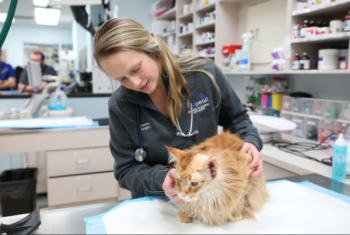Ensure pet safety amid National Poison Prevention Week
Pets navigate and explore their surroundings with their noses and mouths. This, coupled with their curious nature can sometimes lead them into trouble. From rodenticides to human prescription medications like antidepressants and heart medications, accidental ingestion of these common household poisons can be extremely dangerous for your pet.
Pet owner education is always the best way to try to prevent pets from accidentally ingesting these common poisons, but a lot of toxin exposures are unavoidable,” remarked Gary Puglia DVM, DACVECC, Head of Emergency Service, BluePearl Specialty and Emergency Pet Hospital of Langhorne.
“If your pet does ingest something potentially harmful, it can be stressful, and even involve feelings of guilt. Time can be of the essence in these scary situations, and we at BluePearl emergency rooms are always here to help.”
To help educate pet owners on the most frequent household offenders, BluePearl Pet Hospital has compiled a list of the top five most-seen pet toxicities in 2020. The findings were taken from data collected from more than 100 BluePearl Pet Hospitals across 29 U.S. states. Collectively, BluePearl practices cared for more than 1.1 million pets in 2020.
Top 5 Pet Poisons
- Chocolate – Caffeine and theobromine in chocolate can be toxic (even lethal) to dogs. The amount of theobromine varies depending on the type of chocolate, with baking chocolate containing the most and white chocolate containing the least. The risk of poisoning depends on the type and amount of chocolate ingested and the weight of the dog. Symptoms of chocolate poisoning include vomiting, diarrhea, hyperactivity, restlessness, excessive urination and muscle tremors. To ensure your dog’s safety, keep chocolate out of your dog’s reach by storing it in a cabinet or pantry.
- Marijuana – With more states legalizing marijuana, there has been increases in the number of marijuana ingestion cases seen at BluePearl practices, making it critically important to educate pet owners on marijuana toxicity. Tetrahydrocannabinol or THC – the most potent psychoactive cannabinoid in marijuana – can be absorbed both orally and through inhalation. Symptoms can show in as little as 5 minutes, and include depression, lethargy, pupil dilation, slow heart rate, hypothermia and leaking urine. While uncommon, seizures and coma can also occur. Call your veterinarian or bring your pet into a veterinary hospital if they have ingested marijuana or substances containing marijuana.
- Rodenticide – Bricks, pellets, or granules, left out for rats or mice may pose as tasty treats for pets. Rodenticide products are designed to kill rodents by causing high calcium levels, internal bleeding, brain swelling, or toxic gas production; thus, they are particularly dangerous to pets. Never put rodenticides where your pet can access them and ensure neighbors’ rodenticides are kept a safe distance away.
- Grapes – Grapes and raisins are highly toxic to dogs. Signs and symptoms that may occur after ingestion include loss of appetite, lethargy, weakness, vomiting and/or diarrhea, abdominal pain, dehydration (signs include panting, dry nose and mouth, and pale gums), increased thirst, increased urination or urinary incontinence, or kidney failure (this can be fatal). Remember: If your dog has ingested grapes or raisins, treatment is critical. Contact your veterinarian immediately for advice and next steps.
- Human medication – Ingestion of over the counter or prescription human medications such as aspirin, ibuprofen (Advil), acetaminophen (Tylenol), naproxen, ADHD medications, antidepressants, heart medications, cold medications and herbal supplements can be extremely dangerous to pets. Always consult with your veterinarian prior to attempting to treat your pet’s medical problems and never give a medication that is not approved for veterinary use. For good measure, store medication in a cabinet, closet, or drawer. Do not leave medications on countertops or in areas reachable by pets, including pocketbooks or backpacks left on chairs or the floor.
Most BluePearl Pet Hospitals are open 24 hours a day, 365 days a year, to provide emergency care to pets when they are in need. Be sure to take precautions to ensure your pet stays safe; however, for immediate concerns, contact your local veterinarian or animal hospital.


